中考英语阅读理解练习带答案解析及全文翻译
- 格式:doc
- 大小:264.50 KB
- 文档页数:36
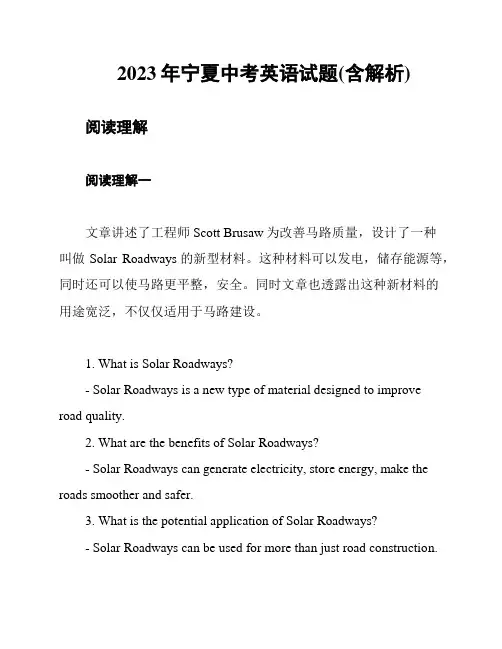
2023年宁夏中考英语试题(含解析)阅读理解阅读理解一文章讲述了工程师Scott Brusaw为改善马路质量,设计了一种叫做Solar Roadways的新型材料。
这种材料可以发电,储存能源等,同时还可以使马路更平整,安全。
同时文章也透露出这种新材料的用途宽泛,不仅仅适用于马路建设。
1. What is Solar Roadways?- Solar Roadways is a new type of material designed to improve road quality.2. What are the benefits of Solar Roadways?- Solar Roadways can generate electricity, store energy, make the roads smoother and safer.3. What is the potential application of Solar Roadways?- Solar Roadways can be used for more than just road construction.阅读理解二文章讲述了一位年轻的钢琴家Maxim Lando的成长历程。
他从小研究钢琴,很快便展现出出色的天赋和表演才华,并在菲拉德尔菲亚乐团演出。
他认为靠自己的努力创作出了成功,同时他也坚信要通过音乐将爱和和平传播到全球。
1. What is the topic of the article?- The article is about the growth of a young pianist Maxim Lando.- Maxim Lando showed exceptional talent and performance skills ata young age and performed in the Philadelphia Orchestra.3. What does Maxim Lando believe in?- Maxim Lando believes that his success is based on his own efforts and wants to spread love and peace around the world through music.书面表达请根据提示内容,写一篇60-80字的短文。
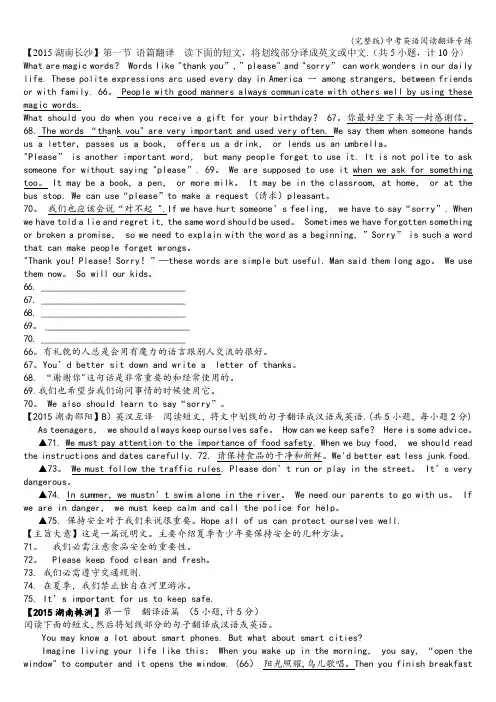
【2015湖南长沙】第一节语篇翻译读下面的短文,将划线部分译成英文或中文.(共5小题,计10分〉What are magic words?Words like "thank you”,”please" and "sorry” can work wonders in our daily life. These polite expressions arc used every day in America 一 among strangers, between friends or with family. 66。
People with good manners always communicate with others well by using these magic words.What should you do when you receive a gift for your birthday? 67。
你最好坐下来写一封感谢信。
68. The words “th ank vou" are very important and used very often. We say them when someone hands us a letter, passes us a book, offers us a drink, or lends us an umbrella。
"Please” is another important word, but many people forget to use it. It is not polite to ask someone for without saying "please”. 69。
We are supposed to use it when we ask for something too。
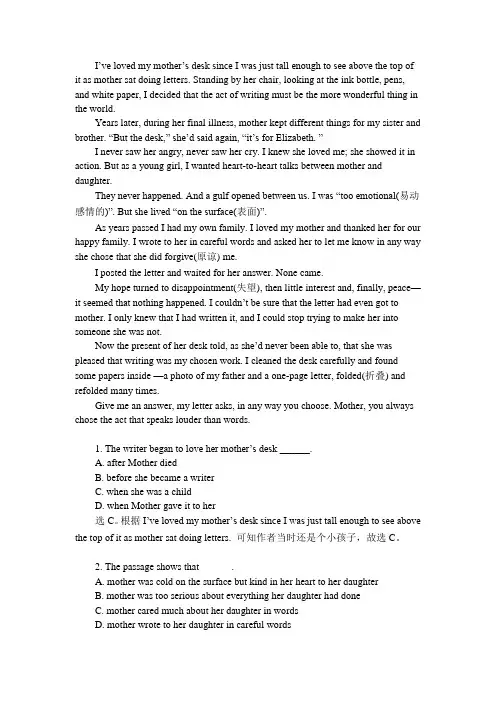
I’ve loved my mother’s desk since I was just tall enough to see above the top of it as mother sat doing letters. Standing by her chair, looking at the ink bottle, pens, and white paper, I decided that the act of writing must be the more wonderful thing in the world.Years later, during her final illness, mother kept different things for my sister and brother. “But the desk,” she’d said again, “it’s for Elizabeth. ”I never saw her angry, never saw her cry. I knew she loved me; she showed it in action. But as a young girl, I wanted heart-to-heart talks between mother and daughter.They never happened. And a gulf opened between us. I was “too emotional(易动感情的)”. But she lived “on the surface(表面)”.As years passed I had my own family. I loved my mother and thanked her for our happy family. I wrote to her in careful words and asked her to let me know in any way she chose that she did forgive(原谅) me.I posted the letter and waited for her answer. None came.My hope turned to disappointment(失望), then little interest and, finally, peace—it seemed that nothing happened. I couldn’t be sure that the letter had even got to mother. I only knew that I had written it, and I could stop trying to make her into someone she was not.Now the present of her desk told, as sh e’d never been able to, that she was pleased that writing was my chosen work. I cleaned the desk carefully and found some papers inside —a photo of my father and a one-page letter, folded(折叠) and refolded many times.Give me an answer, my letter asks, in any way you choose. Mother, you always chose the act that speaks louder than words.1. The writer began to love her mother’s desk ______.A. after Mother diedB. before she became a writerC. when she was a childD. when Mother gave it to her选C。
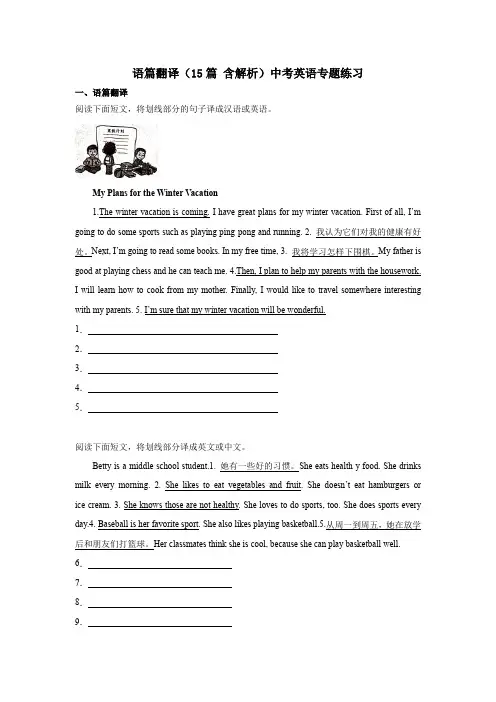
语篇翻译(15篇含解析)中考英语专题练习一、语篇翻译阅读下面短文,将划线部分的句子译成汉语或英语。
My Plans for the Winter Vacation1.The winter vacation is coming. I have great plans for my winter vacation. First of all, I’m going to do some sports such as playing ping-pong and running.2. 我认为它们对我的健康有好处。
Next, I’m going to read some books. In my free time,3. 我将学习怎样下围棋。
My father is good at playing chess and he can teach me.4.Then, I plan to help my parents with the housework.I will learn how to cook from my mother. Finally, I would like to travel somewhere interesting with my parents. 5. I’m sure that my winter vacation will be wonderful.1.2.3.4.5.阅读下面短文,将划线部分译成英文或中文。
Betty is a middle school student.1. 她有一些好的习惯。
She eats health y food. She drinks milk every morning. 2. She likes to eat vegetables and fruit. She doesn’t eat hamburgers or ice-cream. 3. She knows those are not healthy. She loves to do sports, too. She does sports every day.4. Baseball is her favorite sport. She also likes playing basketball.5.从周一到周五,她在放学后和朋友们打篮球。
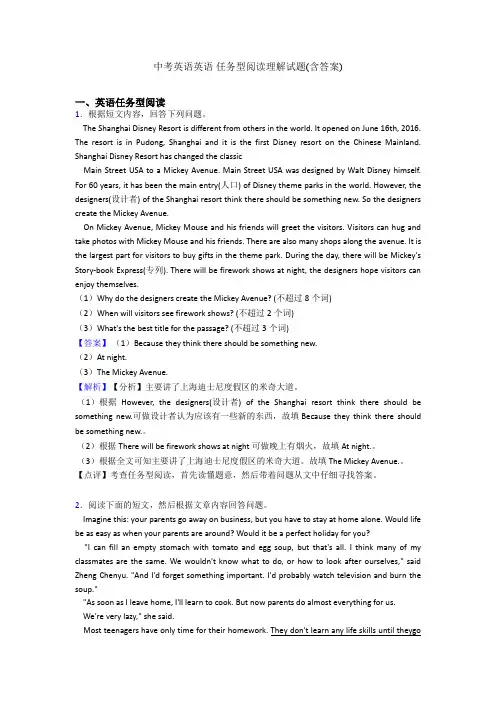
中考英语英语任务型阅读理解试题(含答案)一、英语任务型阅读1.根据短文内容,回答下列问题。
The Shanghai Disney Resort is different from others in the world. It opened on June 16th, 2016. The resort is in Pudong, Shanghai and it is the first Disney resort on the Chinese Mainland. Shanghai Disney Resort has changed the classicMain Street USA to a Mickey Avenue. Main Street USA was designed by Walt Disney himself. For 60 years, it has been the main entry(人口) of Disney theme parks in the world. However, the designers(设计者) of the Shanghai resort think there should be something new. So the designers create the Mickey Avenue.On Mickey Avenue, Mickey Mouse and his friends will greet the visitors. Visitors can hug and take photos with Mickey Mouse and his friends. There are also many shops along the avenue. It is the largest part for visitors to buy gifts in the theme park. During the day, there will be Mickey's Story-book Express(专列). There will be firework shows at night, the designers hope visitors can enjoy themselves.(1)Why do the designers create the Mickey Avenue? (不超过8个词)(2)When will visitors see firework shows? (不超过2个词)(3)What's the best title for the passage? (不超过3个词)【答案】(1)Because they think there should be something new.(2)At night.(3)The Mickey Avenue.【解析】【分析】主要讲了上海迪士尼度假区的米奇大道。
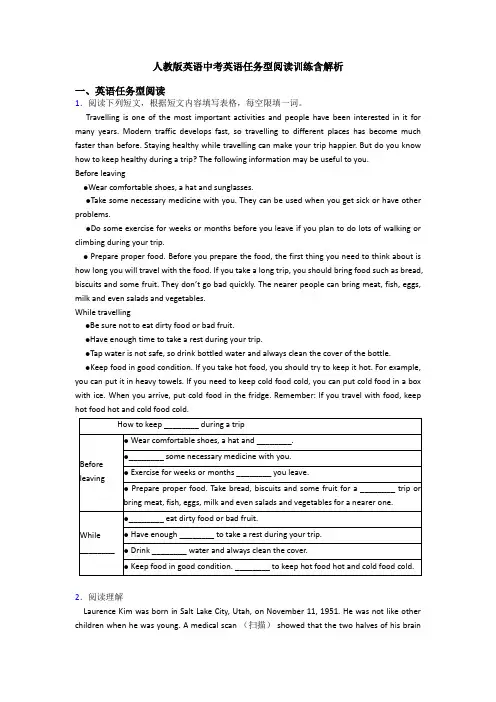
人教版英语中考英语任务型阅读训练含解析一、英语任务型阅读1.阅读下列短文,根据短文内容填写表格,每空限填一词。
Travelling is one of the most important activities and people have been interested in it for many years. Modern traffic develops fast, so travelling to different places has become much faster than before. Staying healthy while travelling can make your trip happier. But do you know how to keep healthy during a trip? The following information may be useful to you.Before leaving●Wear comfortable shoes, a hat and sunglasses.●Take some n ecessary medicine with you. They can be used when you get sick or have other problems.●Do some exercise for weeks or months before you leave if you plan to do lots of walking or climbing during your trip.● Prepare proper food. Before you prepare the food, the first thing you need to think about is how long you will travel with the food. If you take a long trip, you should bring food such as bread, biscuits and some fruit. They don’t go bad quickly. The nearer people can bring meat, fish, eggs, milk and even salads and vegetables.While travelling●Be sure not to eat dirty food or bad fruit.●Have enough time to take a rest during your trip.●Tap water is not safe, so drink bottled water and always clean the cover of the bottle.●Keep food in good condition. If you take hot food, you should try to keep it hot. For example, you can put it in heavy towels. If you need to keep cold food cold, you can put cold food in a box with ice. When you arrive, put cold food in the fridge. Remember: If you travel with food, keep hot food hot and cold food cold.2.阅读理解Laurence Kim was born in Salt Lake City, Utah, on November 11, 1951. He was not like other children when he was young. A medical scan (扫描) showed that the two halves of his brainwere not connected in the usual way. He developed an amazing memory. He started to read when he was two. He remembered everything he had read.To read more quickly, he read the left page with his left eye and the right page with his right eye. By reading the two pages at the same time, ⑴看完一本书花他不到一小时的时间。
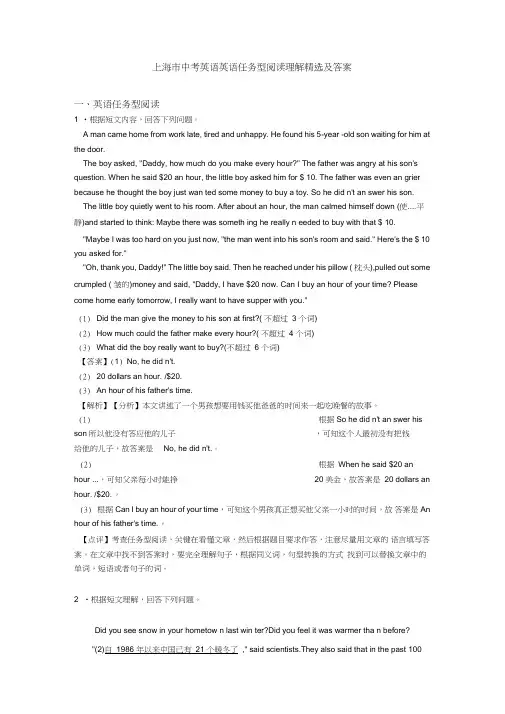
上海市中考英语英语任务型阅读理解精选及答案一、英语任务型阅读1 •根据短文内容,回答下列问题。
A man came home from work late, tired and unhappy. He found his 5-year -old son waiting for him at the door.The boy asked, "Daddy, how much do you make every hour?" The father was angry at his son's question. When he said $20 an hour, the little boy asked him for $ 10. The father was even an grier because he thought the boy just wan ted some money to buy a toy. So he did n't an swer his son.The little boy quietly went to his room. After about an hour, the man calmed himself down (使....平静)and started to think: Maybe there was someth ing he really n eeded to buy with that $ 10."Maybe I was too hard on you just now, "the man went into his son's room and said." Here's the $ 10 you asked for.""Oh, thank you, Daddy!" The little boy said. Then he reached under his pillow ( 枕头),pulled out some crumpled ( 皱的)money and said, "Daddy, I have $20 now. Can I buy an hour of your time? Please come home early tomorrow, I really want to have supper with you."(1)Did the man give the money to his son at first?( 不超过 3 个词)(2)How much could the father make every hour?( 不超过 4 个词)(3)What did the boy really want to buy?(不超过 6 个词)【答案】(1) No, he did n't.(2)20 dollars an hour. /$20.(3)An hour of his father's time.【解析】【分析】本文讲述了一个男孩想要用钱买他爸爸的时间来一起吃晚餐的故事。
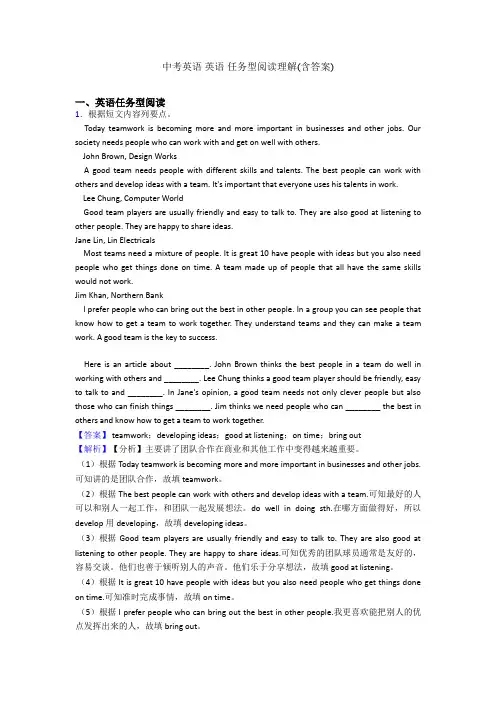
中考英语英语任务型阅读理解(含答案)一、英语任务型阅读1.根据短文内容列要点。
Today teamwork is becoming more and more important in businesses and other jobs. Our society needs people who can work with and get on well with others.John Brown, Design WorksA good team needs people with different skills and talents. The best people can work with others and develop ideas with a team. It's important that everyone uses his talents in work.Lee Chung, Computer WorldGood team players are usually friendly and easy to talk to. They are also good at listening to other people. They are happy to share ideas.Jane Lin, Lin ElectricalsMost teams need a mixture of people. It is great 10 have people with ideas but you also need people who get things done on time. A team made up of people that all have the same skills would not work.Jim Khan, Northern BankI prefer people who can bring out the best in other people. In a group you can see people that know how to get a team to work together. They understand teams and they can make a team work. A good team is the key to success.Here is an article about ________. John Brown thinks the best people in a team do well in working with others and ________. Lee Chung thinks a good team player should be friendly, easy to talk to and ________. In Jane's opinion, a good team needs not only clever people but also those who can finish things ________. Jim thinks we need people who can ________ the best in others and know how to get a team to work together.【答案】 teamwork;developing ideas;good at listening;on time;bring out【解析】【分析】主要讲了团队合作在商业和其他工作中变得越来越重要。
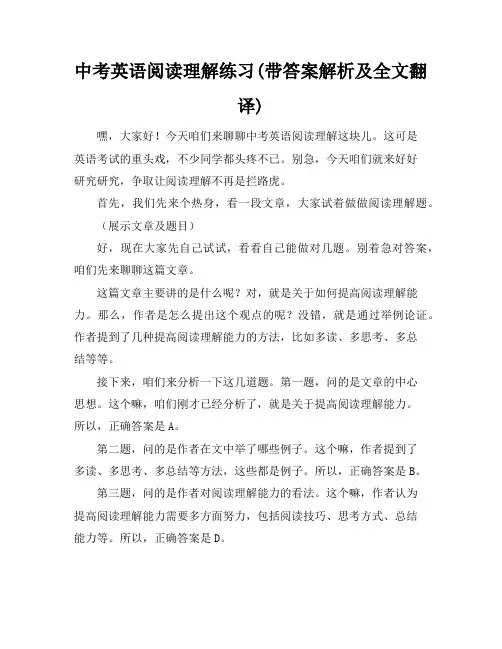
中考英语阅读理解练习(带答案解析及全文翻译)嘿,大家好!今天咱们来聊聊中考英语阅读理解这块儿。
这可是英语考试的重头戏,不少同学都头疼不已。
别急,今天咱们就来好好研究研究,争取让阅读理解不再是拦路虎。
首先,我们先来个热身,看一段文章,大家试着做做阅读理解题。
(展示文章及题目)好,现在大家先自己试试,看看自己能做对几题。
别着急对答案,咱们先来聊聊这篇文章。
这篇文章主要讲的是什么呢?对,就是关于如何提高阅读理解能力。
那么,作者是怎么提出这个观点的呢?没错,就是通过举例论证。
作者提到了几种提高阅读理解能力的方法,比如多读、多思考、多总结等等。
接下来,咱们来分析一下这几道题。
第一题,问的是文章的中心思想。
这个嘛,咱们刚才已经分析了,就是关于提高阅读理解能力。
所以,正确答案是A。
第二题,问的是作者在文中举了哪些例子。
这个嘛,作者提到了多读、多思考、多总结等方法,这些都是例子。
所以,正确答案是B。
第三题,问的是作者对阅读理解能力的看法。
这个嘛,作者认为提高阅读理解能力需要多方面努力,包括阅读技巧、思考方式、总结能力等。
所以,正确答案是D。
好,现在大家应该对这几道题有了更深的理解了吧。
其实,阅读理解并没有那么难,关键是要掌握正确的方法。
下面,我就给大家分享一些提高阅读理解能力的技巧。
首先,多读。
这里的“读”不仅仅是指阅读,还包括朗读、默读等多种方式。
通过多种阅读方式,我们可以提高阅读速度,增强语感。
其次,多思考。
在阅读过程中,我们要学会思考,提出问题,分析问题,解决问题。
这样,我们才能更好地理解文章内容。
再次,多总结。
阅读完一篇文章后,我们要学会总结,提炼出文章的中心思想、主要观点等。
这样,我们在考试中才能迅速找到答案。
最后,多练习。
只有通过大量的练习,我们才能熟练掌握阅读理解技巧,提高解题速度和准确率。
好啦,今天的分享就到这里。
希望大家能通过今天的讲解,对阅读理解有更深入的了解,从而在中考中取得好成绩。
加油哦!。
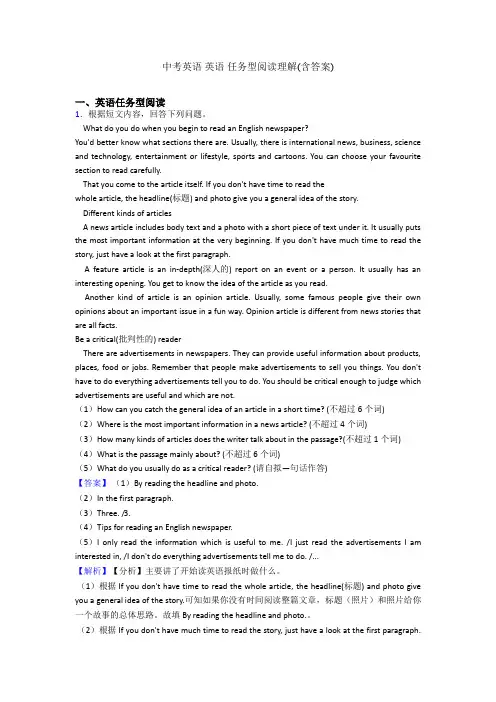
中考英语英语任务型阅读理解(含答案)一、英语任务型阅读1.根据短文内容,回答下列问题。
What do you do when you begin to read an English newspaper?You'd better know what sections there are. Usually, there is international news, business, science and technology, entertainment or lifestyle, sports and cartoons. You can choose your favourite section to read carefully.That you come to the article itself. If you don't have time to read thewhole article, the headline(标题) and photo give you a general idea of the story.Different kinds of articlesA news article includes body text and a photo with a short piece of text under it. It usually puts the most important information at the very beginning. If you don't have much time to read the story, just have a look at the first paragraph.A feature article is an in-depth(深人的) report on an event or a person. It usually has an interesting opening. You get to know the idea of the article as you read.Another kind of article is an opinion article. Usually, some famous people give their own opinions about an important issue in a fun way. Opinion article is different from news stories that are all facts.Be a critical(批判性的) readerThere are advertisements in newspapers. They can provide useful information about products, places, food or jobs. Remember that people make advertisements to sell you things. You don't have to do everything advertisements tell you to do. You should be critical enough to judge which advertisements are useful and which are not.(1)How can you catch the general idea of an article in a short time? (不超过6个词)(2)Where is the most important information in a news article? (不超过4个词)(3)How many kinds of articles does the writer talk about in the passage?(不超过1个词) (4)What is the passage mainly about? (不超过6个词)(5)What do you usually do as a critical reader? (请自拟—句话作答)【答案】(1)By reading the headline and photo.(2)In the first paragraph.(3)Three. /3.(4)Tips for reading an English newspaper.(5)I only read the information which is useful to me. /I just read the advertisements I am interested in, /I don't do everything advertisements tell me to do. /...【解析】【分析】主要讲了开始读英语报纸时做什么。
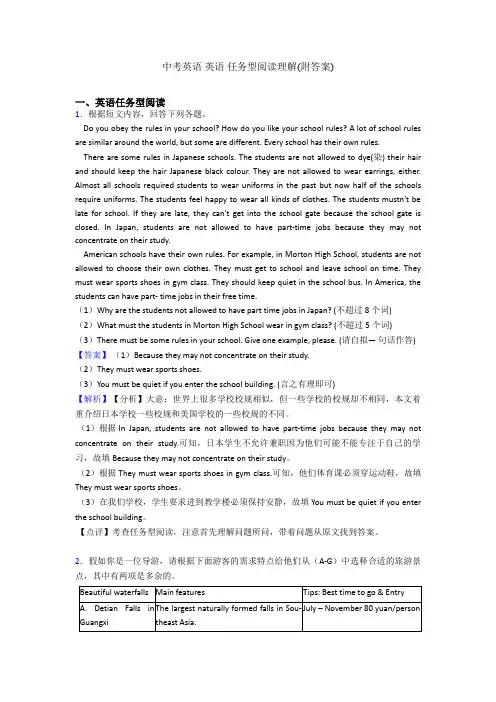
中考英语英语任务型阅读理解(附答案)一、英语任务型阅读1.根据短文内容,回答下列各题。
Do you obey the rules in your school? How do you like your school rules? A lot of school rules are similar around the world, but some are different. Every school has their own rules.There are some rules in Japanese schools. The students are not allowed to dye(染) their hair and should keep the hair Japanese black colour. They are not allowed to wear earrings, either. Almost all schools required students to wear uniforms in the past but now half of the schools require uniforms. The students feel happy to wear all kinds of clothes. The students mustn't be late for school. If they are late, they can't get into the school gate because the school gate is closed. In Japan, students are not allowed to have part-time jobs because they may not concentrate on their study.American schools have their own rules. For example, in Morton High School, students are not allowed to choose their own clothes. They must get to school and leave school on time. They must wear sports shoes in gym class. They should keep quiet in the school bus. In America, the students can have part- time jobs in their free time.(1)Why are the students not allowed to have part time jobs in Japan? (不超过8个词) (2)What must the students in Morton High School wear in gym class? (不超过5个词) (3)There must be some rules in your school. Give one example, please. (请自拟—句话作答) 【答案】(1)Because they may not concentrate on their study.(2)They must wear sports shoes.(3)You must be quiet if you enter the school building. (言之有理即可)【解析】【分析】大意:世界上很多学校校规相似,但一些学校的校规却不相同,本文着重介绍日本学校一些校规和美国学校的一些校规的不同。
兰州市中考英语英语任务型阅读理解(附答案)一、英语任务型阅读1.任务型阅读Boys and girls, welcome to our radio club! Our club is very important in our school now. It was started by Tom ten years ago. When he found it was too quiet during the lunchtime, Tom advised the headmaster to set up a radio club, and he agreed. What great advice! Thanks to Tom, we have had many different programmes to listen to at lunchtime from then on. There is Music Time for us to listen to popular music. And you can hear your favourite songs if you tell us ahead of time. We can give advice on problems too. For example, how should we prepare for exams and how should we make friends? And we can also send your best wishes to your friends or teachers on special days. Do you have a good voice? Can you come here to work on time? If the two answers are "Yes", join us now, please!根据短文内容列要点。
中考英语英语任务型阅读理解(附答案)一、英语任务型阅读1.根据短文内容,回答下列问题。
Dear Alan,Guess what? I have a chance to choose my new place to live! I'm excited and a little nervous. Could you please give me some help?I'm not sure whether I should live in a house or in an apartment. On one hand, a house will be too big for just one person, so maybe I should rent an apartment. On the other hand, if I rent a house, I could find someone else to share with me. The only problem is that a house full of people might be too noisy for me. I prefer to have my own space. The city has some nice apartments, but they are also too expensive. However, if I could find a two-bedroom apartment and get a roommate, that would make it more affordable. I just need to search for a roommate who is neat and quiet. You know I can't live with someone who is loud and messy. I don't have a car, so I also need to think carefully about the location. I probably need to look for somewhere near a bus stop or an underground station. That way I will have more time to study and spend less time travelling.I'm looking forward to your reply.Love,Victor (1)Why does Victor feel excited? (不超过7个词)(2)What kind of person does Victor want to share the house with? (不超过3个词)(3)What place does Victor want to find to live in?(不超过5个词)【答案】(1)Because he can decide where to live.(2)Neat and quiet.(3)A place with convenient traffic.【解析】【分析】文章大意:本文主要说明维克多写给艾伦的一封信,信中维克多就自己选择新居向艾伦寻求帮助。
Jean is a bright young woman who comes from a rich and famous family. She goes to a good university and has everything that money can buy. Well, almost everything. The problem is that the people in Jean’s family are so busy that they can hardly find time to be with her. In fact, Jean is quite lonely.So Jean spends a lot of time on her QQ. She likes being anonymous(匿名), talking to people who do not know about her famous family and her rich life. She uses the name Linda on QQ and has made a lot of friends who she keeps in touch with quite often.Last year Jean made a very special friend on QQ. His name was David and lived in San Francisco. David was full of stories and jokes. He and Jean had a common(共同的) interest in rock music and modern dance. So it always took them hours to talk happily on QQ and sometimes they even forgot their time. Of course, they wanted to know more about each other. David sent a picture of himself: He was a tall,good-looking young man with a big, happy smile. As time went by, they became good friends and often sent cards and small things to each other.When Jean’s father told her that he was going on a business trip to San Francisco, she asked him to let her go with him so that she could give David a surprise for his birthday. She would take him the latest DVD of their favorite rock singer. But when she knocked on David’s door in San Francisco, she found that her special friend was a twelve-year-old boy named Jim!1. Jean spends a lot of her time on QQ because she is _______.A. richB. famousC. youngD. lonely选D。
中考英语阅读理解练习(带答案解析及全文翻译)1We know the mosquito very well. Mosquitoes fly everywhere. They can be found almost all over the world, and there are more than 2,500 kinds of them.No one likes the mosquito. But the mosquito may decide that she loves you. She? Ye s, she. It’s true that male mosquito doesn’t bite(咬) and only the female mosquito bites because she needs blood to lay eggs. She is always looking for things or people she wants to bite. If she likes what she finds, she bites. But if she doesn’t like your blood, she will turn to someone else for more delicious blood. Next time a mosquito bites you, just remember you are chosen. You’re different from the others!If the mosquito likes you, she lands on your body without letting you know. She bites you so quickly and quietly that you may not feel anything different. After she bites, you will have an itch(痒) on your body because she puts something from her mouth together with your blood. By the time the itching begins, and she has flown away.And then what happens? Well, after her delicious dinner, the mosquito feels tired. She just wants to find a place to have a good rest. There, on a leaf or a wall, she begins to lay eggs, hundreds of eggs. And then what happens?1. “Mosquito” means _______ in Chinese.A. 苍蝇B. 蜻蜓C. 跳蚤D. 蚊子2. We know mosquitoes very well because ___________.A. they can be found easilyB. they fly here and thereC. there are many kinds of themD. they can fly3. If the mosquito doesn’t bite you, it will ________.A. get angry with youB. be afraid of youC. make a lot of noiseD. choose another one4. The mosquito bites you _________.A. when you’re asleepB. because you have choose itC. too quickly to let you knowD. but doesn’t like you5. Which of the following sentences is wrong?A. The itching begins after the mosquito bites you.B. You feel terrible when the mosquito bites you.C. Mosquitoes use blood to lay eggs.D. All the mosquitoes don’t like to bite people for blood.2At the shopping mall, you probably think about spending, not saving. Think about all the lights that keep the mall bright. Think about all the water faucets (水龙头) in the toilet. Think about all the air conditioning in summer. Saving energy is a hot topic for such a big place!Many things at the mall use energy. Electric lights, infrared (红外感应) faucets andair-conditioners need electricity to work.One way to save energy is by keeping lights clean. More and more dust and dirt make the lights less bright. When malls keep lights clean, they can use fewer lights and keep the area just as bright. Using fewer lights means using less energy.You step up to the water faucet. The water starts to flow. You don’t have to touch a thing. Why do malls have such fancy faucets? The answer is simple. They save water. Sometimes people forget to turn the water off after they wash. Infrared faucets turn themselves off.1. _____ is a hot topic for a big mall.A.To spend money B.To Save energyC.To keep the mall bright D.To buy things2.What will the fourth paragraph probably talk about?A.How to save water when using infrared faucets irl the mall.B. How to save energy when using air—conditioners in the mail.C.How to save money When shopping in the mail.3.The best title for the passage is _______.A.Lights, faucets and air—conditioners B. Spending less moneyC.Energy saving at the mall D. A hot topic3I’ve loved my mother’s desk since I was just tall enough to see above the top of it as mother sat doing letters. Standing by her chair, looking at the ink bottle, pens, and white paper, I decided that the act of writing must be the more wonderful thing in the world.Years later, during her final illness, mother kept different things for my sister and brother. “But the desk,” she’d said again, “it’s for Elizabeth. ”I never saw her angry, never saw her cry. I knew she loved me; she showed it in action. But as a young girl, I wanted heart-to-heart talks between mother and daughter.They never happened. And a gulf opened between us. I was “too emotio nal(易动感情的)”. But she lived “on the surface(表面)”.As years passed I had my own family. I loved my mother and thanked her for our happy family. I wrote to her in careful words and asked her to let me know in any way she chose that she didforgive(原谅) me.I posted the letter and waited for her answer. None came.My hope turned to disappointment(失望), then little interest and, finally, peace— it seemed that nothing happened. I couldn’t be sure that the letter had even got to mother. I only knew that I had written it, and I could stop trying to make her into someone she was not.Now the present of her desk told, as she’d never been able to, that she was pleased that writing was my chosen work. I cleaned the desk carefully and found some papers inside —a photo of my father and a one-page letter, folded(折叠) and refolded many times.Give me an answer, my letter asks, in any way you choose. Mother, you always chose the act that speaks louder than words.1. The writer began to love her mother’s desk ______.A. after Mother diedB. before she became a writerC. when she was a childD. when Mother gave it to her2. The passage shows that ______.A. mother was cold on the surface but kind in her heart to her daughterB. mother was too serious about everything her daughter had doneC. mother cared much about her daughter in wordsD. mother wrote to her daughter in careful words3. The word “gulf” in the passage means ______.A. deep understanding between the old and the youngB. different ideas between the mother and the daughterC. free talks between mother and daughterD. part of the sea going far in land4. What did mother do with her daughter’s letter asking forgiveness?A. She had never received the letter.B. For years, she often talked about the letter.C. She didn’t forgive her daughter at all in all her life.D. She read the letter again and again till she died.5. What’s the best title of the passage?A. My letter to MotherB. Mother and ChildrenC. My mother’s DeskD. Talks between Mother and Me4Here are some tips (建议) on how to stay safe in earthquakes (地震).1.Stay inside and duck and cover. Get under a desk or table, or stand in a corner or under a doorway. Cover your head and neck with your arms.2.Move against a wall if in a high building with no protective desk or table nearby. Cover your head and neck with your arms.3.Try to get into an open area away from trees, buildings, walls, and power lines (电杆) if outdoors。
中考英语英语任务型阅读理解练习题(含答案)一、英语任务型阅读1.根据材料内容,从A—G七个选项中选择五个还原到文中空白处,使材料完整、通顺。
My challenge for you is this: to read a book for 15 minutes a day. Let me explain where the challenge came from.I have many things in common with my dad, like music taste and sense of humor, but sadly reading isn't one of them. I can happily spend a whole day reading a book. ________ He reads e-mails, websites and papers for work, but not books. He is a busy person, with a short attention span, so I think that sitting down to read for just 15 minutes a day is a good way to introduce him to reading. Giving yourself a goal or challenge is a good way to change a habit or achieve something, so why not try to develop a new habit of reading?________ Everyone is different and has their own interests, but I think there are lots of benefits of reading, which screen-based activities (games, films,TV) don't have.________ Looking at screens can cause tire eyes, and you should avoid looking at screens for a long time.Another thing I love about reading is being transported to another world. ________ So you go to bed. Because you think more about the world of the book, rather than the real world and the problems you have during the day, so you can truly relax.I also love people. I enjoy hearing what people are doing and finding out what people think.________ It also teaches me to see things from other people's point of view, and understand other people's decisions or opinions.So give it a try! Include 15 minutes of reading in your daily schedule and see the difference you can make.A. Firstly, it's better for your eyes.B. But my dad can't read a book for longer than 5 minutes.C. I often forget the time or things that are going on around me.D. Reading ten thousand books is like travelling ten thousand miles.E. Reading gives me the chance to get to know hundreds of new people.F. You can download free e-books online and read them on your computer.G. I know lots of people would rather relax at the computer or in front of the TV.【答案】 B;G;A;D;E【解析】【分析】所给选项意思:A. Firstly, it's better for your eyes.首先,它对你的眼睛是更好。
中考英语英语任务型阅读理解(及答案)一、英语任务型阅读1.根据短文及表格内容列要点。
In order to learn how the students in our school spend money, we made a survey by asking them some questions. First, we asked them how much money they spent last month. And then we asked how much money they spent on snacks, books, movies, computer games, phones, transportation and other things last month. Our maths teacher helped us make a graph(图表) of their answers as follows.In our school, each student spent about________yuan on average(平均) last month. According to the graph made by our________, teacher, we know how much money the students spent on different things in our school. As the graph shows, they spent most on________, covering 22% of all. It was followed by computer games and movies. Each of them was________. But to our surprise, the students spent________on books, only 6%.【答案】 a hundred/ one hundred/100;maths;Snacks;18%/ eighteen percent/18 percent;least【解析】【分析】本文介绍了我们学校的学生是如何花钱。
中考英语阅读理解训练1We know the mosquito very well. Mosquitoes fly everywhere. They can be found almost all over the world, and there are more than 2,500 kinds of them.No one likes the mosquito. But the mosquito may decide that she loves you. She Yes, she. It’s true that male mosquito doesn’t bite(咬) and only the female mosquito bites because she needs blood to lay eggs. She is always looking for things or people she wants to bite. If she likes what she finds, she bites. But if she doe sn’t like your blood, she will turn to someone else for more delicious blood. Next time a mosquito bites you, just remember you are chosen. You’re different from the others!If the mosquito likes you, she lands on your body without letting you know. She bites you so quickly and quietly that you may not feel anything different. After she bites, you will have an itch(痒) on your body because she puts something from her mouth together with your blood. By the time the itching begins, and she has flown away.And then what happens Well, after her delicious dinner, the mosquito feels tired. She just wants to find a place to have a good rest. There, on a leaf or a wall, she begins to lay eggs, hundreds of eggs. And then what happens1. “Mosquito” means _______ in Chinese.A. 苍蝇B. 蜻蜓C. 跳蚤D. 蚊子2. We know mosquitoes very well because ___________.A. they can be found easilyB. they fly here and thereC. there are many kinds of themD. they can fly3. If the mosquito doesn’t bite you, it will ________.A. get angry with youB. be afraid of youC. make a lot of noiseD. choose another one4. The mosquito bites you _________.A. when you’re asleepB. because you have choose itC. too quickly to let you knowD. but doesn’t like you5. Which of the following sentences is wrongA. The itching begins after the mosquito bites you.B. You feel terrible when the mosquito bites you.C. Mosquitoes use blood to lay eggs.D. All the mosquitoes don’t like to bite people for blood.2At the shopping mall, you probably think about spending, not saving. Think about all the lights that keep the mall bright. Think about all the water faucets (水龙头) in the toilet. Think about all the air conditioning in summer. Saving energy is a hot topic for such a big place!Many things at the mall use energy. Electric lights, infrared (红外感应) faucets and air-conditioners need electricity to work.One way to save energy is by keeping lights clean. More and more dust and dirt make the lights less bright. When malls keep lights clean, they can use fewer lights and keep the area just as bright. Using fewer lights means using less energy.You step up to the water faucet. The water starts to flow. You don’t have to touch a thing. Why do malls have such fancy faucets The answer is simple. They save water. Sometimes people forget to turn the water off after they wash. Infrared faucets turn themselves off.1. _____ is a hot topic for a big mall.A.To spend money B.To Save energyC.To keep the mall bright D.To buy things2.What will the fourth paragraph probably talk aboutA.How to save water when using infrared faucets irl the mall.B. How to save energy when using air—conditioners in the mail.C.How to save money When shopping in the mail.3.The best title for the passage is _______.A.Lights, faucets and air—conditioners B. Spending less moneyC.Energy saving at the mall D. A hot topic3I’ve loved my mother’s desk since I was just tall enough to see above the top of it as mother sat doing letters. Standing by her chair, looking at the ink bottle, pens, and white paper, I decided that the act of writing must be the more wonderful thing in the world.Years later, during her final illness, mother kept different things for my sister and brother. “But the desk,” she’d said again, “it’s for Elizabeth. ”I never saw her angry, never saw her cry. I knew she loved me; she showed it in action. But as a young girl, I wanted heart-to-heart talks between mother and daughter.They never happened. And a gulf opened between us. I was “too emotional(易动感情的)”. But she lived “on the surface(表面)”.As years passed I had my own family. I loved my mother and thanked her for our happy family. I wrote to her in careful words and asked her to let me know in any way she chose that she did forgive(原谅) me.I posted the letter and waited for her answer. None came.My hope turned to disappointment(失望), then little interest and, finally, peace—it seemed that nothing happened. I couldn’t be sure that the letter had even got to mother. I only knew that I had written it, and I could stop trying to make her into someone she was not.Now the present of her desk told, as she’d never been able to, that she was pleased that writing was my chosen work. I cleaned the desk carefully and found some papers inside —a photo of my father and a one-page letter, folded(折叠) and refolded many times.Give me an answer, my letter asks, in any way you choose. Mother, you always chose the act that speaks louder than words.1. The writer began to love her mother’s desk ______.A. after Mother diedB. before she became a writerC. when she was a childD. when Mother gave it to her2. The passage shows that ______.A. mother was cold on the surface but kind in her heart to her daughterB. mother was too serious about everything her daughter had doneC. mother cared much about her daughter in wordsD. mother wrote to her daughter in careful words3. The word “gulf” in the passage means ______.A. deep understanding between the old and the youngB. different ideas between the mother and the daughterC. free talks between mother and daughterD. part of the sea going far in land4. What did mother do with her daughter’s letter asking forgivenessA. She had never received the letter.B. For years, she often talked about the letter.C. She didn’t forgive her daughter at all in all her life.D. She read the letter again and again till she died.5. What’s the best title of the passageA. My letter to MotherB. Mother and ChildrenC. My mother’s DeskD. Talks between Mother and Me4Here are some tips (建议) on how to stay safe in earthquakes (地震).1.Stay inside and duck and cover. Get under a desk or table, or stand in a corner or under a doorway. Cover your head and neck with your arms.2.Move against a wall if in a high building with no protective desk or table nearby. Cover your head and neck with your arms.3.Try to get into an open area away from trees, buildings, walls, and power lines (电杆) if outdoors。